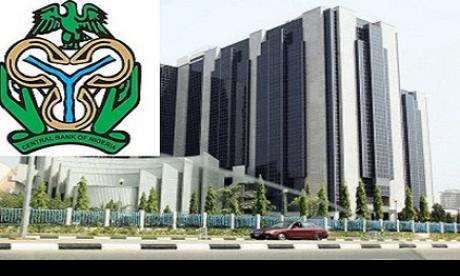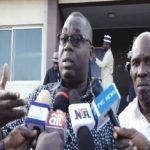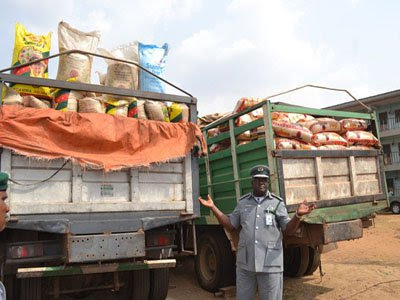As part of its efforts to protect bank customers from undue exploitation, the Central Bank of Nigeria, CBN said on Wednesday it has so far recovered over N50 billion from erring banks as excessive charges imposed on customers.
The bank’s spokesperson, Isaac Okorafor, said at the ongoing Abuja International Trade fair that the CBN was determined to ensure that no bank customer was overburdened with excessive charges from their banks.
He said that the money was recovered by the Consumer Protection Department of the bank over the last three years after customers complained of excess or illegal charges by their banks.
“We have always asked bank customers to report all cases of suspected illegal and excessive charges they feel their banks may have imposed on them. Bank customers must ensure they visit the CBN website to see the approved charges banks are expected to make of their customers,” Mr. Okorafor said.
Reviewing other activities by the CBN to grow the economy and create jobs, Mr. Okorafor said so far about N43.92 billion has been disbursed to local farmers under the Anchor Borrowers Programme, ABP, its agricultural intervention initiative.
He said the programme was executed in collaboration with 13 participating financial institutions and over 200,000 smallholder farmers from 29 states of the federation.
Through the ABP, the CBN spokesperson said over 233,000 hectares of farmland were currently being cultivated with eight commodities, comprising rice, wheat, maize, cotton, soya beans, poultry, cassava and groundnuts, in addition to fish farming.
The thrust of the programme, he explained, was the provision of farm inputs in kind and cash for farm labour and smallholder farmers to boost production of the selected commodities, stabilise inputs supply to agro-processors and address the country’s negative balance of payments on food.
“At harvest, the smallholder farmers supplies his or her produce to the agro-processor, who pays the cash equivalent to the farmer’s account. We cannot continue to allow our farmers go hungry, while we pay huge amounts of money on imports that enrich farmers from other countries. This is why then CBN said if anyone would want to import any of the 41 items, one must source for their own foreign exchange,” Mr. Okoroafor said.
Besides, he said, the other measures adopted under the ABP for agriculture was to make farmers rise up and fill the space and gap created by the non-importation of those items.
This initiative has resulted in over two million tons of rice being produced locally out of the country’s national demand of about six million tons.
He said the CBN was very hopeful that an additional two million tons of rice would be produced this year, with the target of becoming self-sufficient in rice production next year.
Mr. Okorafor said the economy was already on the path of sufficiency through non-oil exports as the Central Bank conserving foreign exchange to sustain the funding of the 17 intervention programmes.
The initiatives included the Agricultural Credit Guarantee Scheme Fund, for which a N200 billion funding has been provided; Commercial Agricultural Credit Scheme, N200 billion; SME Restructuring and Refinancing Facility and the N300 billion Power and Airline Intervention Fund.
Others include the Youth Entrepreneurship Development Programme, Nigeria Electricity Market Stabilisation Facility, Export Rediscounting and Refinancing Facility, Export Stimulation facility and Paddy Aggregation Scheme amongst others.
”We are committed to continually undertake proactive policies and schemes to ensure the Nigerian economy remained strong and sufficient through non-oil exports,” he said.
The Second Deputy President, Abuja Chamber of Commerce and Industry, ABUCCIMA Al-Mujtaba Abubakar, urged the bank to consider reviewing some of its policy stands as it was negatively impacting on small businesses.
He said while the CBN must be commended for its roles in getting the country’s economy out of recession, ”something drastic must be done about the subsisting high lending rate.”
He pointed out that it was stifling the productivity of the real sector.
As part of its efforts to protect bank customers from undue exploitation, the Central Bank of Nigeria, CBN said on Wednesday it has so far recovered over N50 billion from erring banks as excessive charges imposed on customers.
The bank’s spokesperson, Isaac Okorafor, said at the ongoing Abuja International Trade fair that the CBN was determined to ensure that no bank customer was overburdened with excessive charges from their banks.
He said that the money was recovered by the Consumer Protection Department of the bank over the last three years after customers complained of excess or illegal charges by their banks.
“We have always asked bank customers to report all cases of suspected illegal and excessive charges they feel their banks may have imposed on them. Bank customers must ensure they visit the CBN website to see the approved charges banks are expected to make of their customers,” Mr. Okorafor said.
Reviewing other activities by the CBN to grow the economy and create jobs, Mr. Okorafor said so far about N43.92 billion has been disbursed to local farmers under the Anchor Borrowers Programme, ABP, its agricultural intervention initiative.
He said the programme was executed in collaboration with 13 participating financial institutions and over 200,000 smallholder farmers from 29 states of the federation.
Through the ABP, the CBN spokesperson said over 233,000 hectares of farmland were currently being cultivated with eight commodities, comprising rice, wheat, maize, cotton, soya beans, poultry, cassava and groundnuts, in addition to fish farming.
The thrust of the programme, he explained, was the provision of farm inputs in kind and cash for farm labour and smallholder farmers to boost production of the selected commodities, stabilise inputs supply to agro-processors and address the country’s negative balance of payments on food.
“At harvest, the smallholder farmers supplies his or her produce to the agro-processor, who pays the cash equivalent to the farmer’s account. We cannot continue to allow our farmers go hungry, while we pay huge amounts of money on imports that enrich farmers from other countries. This is why then CBN said if anyone would want to import any of the 41 items, one must source for their own foreign exchange,” Mr. Okoroafor said.
Besides, he said, the other measures adopted under the ABP for agriculture was to make farmers rise up and fill the space and gap created by the non-importation of those items.
This initiative has resulted in over two million tons of rice being produced locally out of the country’s national demand of about six million tons.
He said the CBN was very hopeful that an additional two million tons of rice would be produced this year, with the target of becoming self-sufficient in rice production next year.
Mr. Okorafor said the economy was already on the path of sufficiency through non-oil exports as the Central Bank conserving foreign exchange to sustain the funding of the 17 intervention programmes.
The initiatives included the Agricultural Credit Guarantee Scheme Fund, for which a N200 billion funding has been provided; Commercial Agricultural Credit Scheme, N200 billion; SME Restructuring and Refinancing Facility and the N300 billion Power and Airline Intervention Fund.
Others include the Youth Entrepreneurship Development Programme, Nigeria Electricity Market Stabilisation Facility, Export Rediscounting and Refinancing Facility, Export Stimulation facility and Paddy Aggregation Scheme amongst others.
”We are committed to continually undertake proactive policies and schemes to ensure the Nigerian economy remained strong and sufficient through non-oil exports,” he said.
The Second Deputy President, Abuja Chamber of Commerce and Industry, ABUCCIMA Al-Mujtaba Abubakar, urged the bank to consider reviewing some of its policy stands as it was negatively impacting on small businesses.
He said while the CBN must be commended for its roles in getting the country’s economy out of recession, ”something drastic must be done about the subsisting high lending rate.”
He pointed out that it was stifling the productivity of the real sector.
As part of its efforts to protect bank customers from undue exploitation, the Central Bank of Nigeria, CBN said on Wednesday it has so far recovered over N50 billion from erring banks as excessive charges imposed on customers.
The bank’s spokesperson, Isaac Okorafor, said at the ongoing Abuja International Trade fair that the CBN was determined to ensure that no bank customer was overburdened with excessive charges from their banks.
He said that the money was recovered by the Consumer Protection Department of the bank over the last three years after customers complained of excess or illegal charges by their banks.
“We have always asked bank customers to report all cases of suspected illegal and excessive charges they feel their banks may have imposed on them. Bank customers must ensure they visit the CBN website to see the approved charges banks are expected to make of their customers,” Mr. Okorafor said.
Reviewing other activities by the CBN to grow the economy and create jobs, Mr. Okorafor said so far about N43.92 billion has been disbursed to local farmers under the Anchor Borrowers Programme, ABP, its agricultural intervention initiative.
He said the programme was executed in collaboration with 13 participating financial institutions and over 200,000 smallholder farmers from 29 states of the federation.
Through the ABP, the CBN spokesperson said over 233,000 hectares of farmland were currently being cultivated with eight commodities, comprising rice, wheat, maize, cotton, soya beans, poultry, cassava and groundnuts, in addition to fish farming.
The thrust of the programme, he explained, was the provision of farm inputs in kind and cash for farm labour and smallholder farmers to boost production of the selected commodities, stabilise inputs supply to agro-processors and address the country’s negative balance of payments on food.
“At harvest, the smallholder farmers supplies his or her produce to the agro-processor, who pays the cash equivalent to the farmer’s account. We cannot continue to allow our farmers go hungry, while we pay huge amounts of money on imports that enrich farmers from other countries. This is why then CBN said if anyone would want to import any of the 41 items, one must source for their own foreign exchange,” Mr. Okoroafor said.
Besides, he said, the other measures adopted under the ABP for agriculture was to make farmers rise up and fill the space and gap created by the non-importation of those items.
This initiative has resulted in over two million tons of rice being produced locally out of the country’s national demand of about six million tons.
He said the CBN was very hopeful that an additional two million tons of rice would be produced this year, with the target of becoming self-sufficient in rice production next year.
Mr. Okorafor said the economy was already on the path of sufficiency through non-oil exports as the Central Bank conserving foreign exchange to sustain the funding of the 17 intervention programmes.
The initiatives included the Agricultural Credit Guarantee Scheme Fund, for which a N200 billion funding has been provided; Commercial Agricultural Credit Scheme, N200 billion; SME Restructuring and Refinancing Facility and the N300 billion Power and Airline Intervention Fund.
Others include the Youth Entrepreneurship Development Programme, Nigeria Electricity Market Stabilisation Facility, Export Rediscounting and Refinancing Facility, Export Stimulation facility and Paddy Aggregation Scheme amongst others.
”We are committed to continually undertake proactive policies and schemes to ensure the Nigerian economy remained strong and sufficient through non-oil exports,” he said.
The Second Deputy President, Abuja Chamber of Commerce and Industry, ABUCCIMA Al-Mujtaba Abubakar, urged the bank to consider reviewing some of its policy stands as it was negatively impacting on small businesses.
He said while the CBN must be commended for its roles in getting the country’s economy out of recession, ”something drastic must be done about the subsisting high lending rate.”
He pointed out that it was stifling the productivity of the real sector.
As part of its efforts to protect bank customers from undue exploitation, the Central Bank of Nigeria, CBN said on Wednesday it has so far recovered over N50 billion from erring banks as excessive charges imposed on customers.
The bank’s spokesperson, Isaac Okorafor, said at the ongoing Abuja International Trade fair that the CBN was determined to ensure that no bank customer was overburdened with excessive charges from their banks.
He said that the money was recovered by the Consumer Protection Department of the bank over the last three years after customers complained of excess or illegal charges by their banks.
“We have always asked bank customers to report all cases of suspected illegal and excessive charges they feel their banks may have imposed on them. Bank customers must ensure they visit the CBN website to see the approved charges banks are expected to make of their customers,” Mr. Okorafor said.
Reviewing other activities by the CBN to grow the economy and create jobs, Mr. Okorafor said so far about N43.92 billion has been disbursed to local farmers under the Anchor Borrowers Programme, ABP, its agricultural intervention initiative.
He said the programme was executed in collaboration with 13 participating financial institutions and over 200,000 smallholder farmers from 29 states of the federation.
Through the ABP, the CBN spokesperson said over 233,000 hectares of farmland were currently being cultivated with eight commodities, comprising rice, wheat, maize, cotton, soya beans, poultry, cassava and groundnuts, in addition to fish farming.
The thrust of the programme, he explained, was the provision of farm inputs in kind and cash for farm labour and smallholder farmers to boost production of the selected commodities, stabilise inputs supply to agro-processors and address the country’s negative balance of payments on food.
“At harvest, the smallholder farmers supplies his or her produce to the agro-processor, who pays the cash equivalent to the farmer’s account. We cannot continue to allow our farmers go hungry, while we pay huge amounts of money on imports that enrich farmers from other countries. This is why then CBN said if anyone would want to import any of the 41 items, one must source for their own foreign exchange,” Mr. Okoroafor said.
Besides, he said, the other measures adopted under the ABP for agriculture was to make farmers rise up and fill the space and gap created by the non-importation of those items.
This initiative has resulted in over two million tons of rice being produced locally out of the country’s national demand of about six million tons.
He said the CBN was very hopeful that an additional two million tons of rice would be produced this year, with the target of becoming self-sufficient in rice production next year.
Mr. Okorafor said the economy was already on the path of sufficiency through non-oil exports as the Central Bank conserving foreign exchange to sustain the funding of the 17 intervention programmes.
The initiatives included the Agricultural Credit Guarantee Scheme Fund, for which a N200 billion funding has been provided; Commercial Agricultural Credit Scheme, N200 billion; SME Restructuring and Refinancing Facility and the N300 billion Power and Airline Intervention Fund.
Others include the Youth Entrepreneurship Development Programme, Nigeria Electricity Market Stabilisation Facility, Export Rediscounting and Refinancing Facility, Export Stimulation facility and Paddy Aggregation Scheme amongst others.
”We are committed to continually undertake proactive policies and schemes to ensure the Nigerian economy remained strong and sufficient through non-oil exports,” he said.
The Second Deputy President, Abuja Chamber of Commerce and Industry, ABUCCIMA Al-Mujtaba Abubakar, urged the bank to consider reviewing some of its policy stands as it was negatively impacting on small businesses.
He said while the CBN must be commended for its roles in getting the country’s economy out of recession, ”something drastic must be done about the subsisting high lending rate.”
He pointed out that it was stifling the productivity of the real sector.
As part of its efforts to protect bank customers from undue exploitation, the Central Bank of Nigeria, CBN said on Wednesday it has so far recovered over N50 billion from erring banks as excessive charges imposed on customers.
The bank’s spokesperson, Isaac Okorafor, said at the ongoing Abuja International Trade fair that the CBN was determined to ensure that no bank customer was overburdened with excessive charges from their banks.
He said that the money was recovered by the Consumer Protection Department of the bank over the last three years after customers complained of excess or illegal charges by their banks.
“We have always asked bank customers to report all cases of suspected illegal and excessive charges they feel their banks may have imposed on them. Bank customers must ensure they visit the CBN website to see the approved charges banks are expected to make of their customers,” Mr. Okorafor said.
Reviewing other activities by the CBN to grow the economy and create jobs, Mr. Okorafor said so far about N43.92 billion has been disbursed to local farmers under the Anchor Borrowers Programme, ABP, its agricultural intervention initiative.
He said the programme was executed in collaboration with 13 participating financial institutions and over 200,000 smallholder farmers from 29 states of the federation.
Through the ABP, the CBN spokesperson said over 233,000 hectares of farmland were currently being cultivated with eight commodities, comprising rice, wheat, maize, cotton, soya beans, poultry, cassava and groundnuts, in addition to fish farming.
The thrust of the programme, he explained, was the provision of farm inputs in kind and cash for farm labour and smallholder farmers to boost production of the selected commodities, stabilise inputs supply to agro-processors and address the country’s negative balance of payments on food.
“At harvest, the smallholder farmers supplies his or her produce to the agro-processor, who pays the cash equivalent to the farmer’s account. We cannot continue to allow our farmers go hungry, while we pay huge amounts of money on imports that enrich farmers from other countries. This is why then CBN said if anyone would want to import any of the 41 items, one must source for their own foreign exchange,” Mr. Okoroafor said.
Besides, he said, the other measures adopted under the ABP for agriculture was to make farmers rise up and fill the space and gap created by the non-importation of those items.
This initiative has resulted in over two million tons of rice being produced locally out of the country’s national demand of about six million tons.
He said the CBN was very hopeful that an additional two million tons of rice would be produced this year, with the target of becoming self-sufficient in rice production next year.
Mr. Okorafor said the economy was already on the path of sufficiency through non-oil exports as the Central Bank conserving foreign exchange to sustain the funding of the 17 intervention programmes.
The initiatives included the Agricultural Credit Guarantee Scheme Fund, for which a N200 billion funding has been provided; Commercial Agricultural Credit Scheme, N200 billion; SME Restructuring and Refinancing Facility and the N300 billion Power and Airline Intervention Fund.
Others include the Youth Entrepreneurship Development Programme, Nigeria Electricity Market Stabilisation Facility, Export Rediscounting and Refinancing Facility, Export Stimulation facility and Paddy Aggregation Scheme amongst others.
”We are committed to continually undertake proactive policies and schemes to ensure the Nigerian economy remained strong and sufficient through non-oil exports,” he said.
The Second Deputy President, Abuja Chamber of Commerce and Industry, ABUCCIMA Al-Mujtaba Abubakar, urged the bank to consider reviewing some of its policy stands as it was negatively impacting on small businesses.
He said while the CBN must be commended for its roles in getting the country’s economy out of recession, ”something drastic must be done about the subsisting high lending rate.”
He pointed out that it was stifling the productivity of the real sector.
As part of its efforts to protect bank customers from undue exploitation, the Central Bank of Nigeria, CBN said on Wednesday it has so far recovered over N50 billion from erring banks as excessive charges imposed on customers.
The bank’s spokesperson, Isaac Okorafor, said at the ongoing Abuja International Trade fair that the CBN was determined to ensure that no bank customer was overburdened with excessive charges from their banks.
He said that the money was recovered by the Consumer Protection Department of the bank over the last three years after customers complained of excess or illegal charges by their banks.
“We have always asked bank customers to report all cases of suspected illegal and excessive charges they feel their banks may have imposed on them. Bank customers must ensure they visit the CBN website to see the approved charges banks are expected to make of their customers,” Mr. Okorafor said.
Reviewing other activities by the CBN to grow the economy and create jobs, Mr. Okorafor said so far about N43.92 billion has been disbursed to local farmers under the Anchor Borrowers Programme, ABP, its agricultural intervention initiative.
He said the programme was executed in collaboration with 13 participating financial institutions and over 200,000 smallholder farmers from 29 states of the federation.
Through the ABP, the CBN spokesperson said over 233,000 hectares of farmland were currently being cultivated with eight commodities, comprising rice, wheat, maize, cotton, soya beans, poultry, cassava and groundnuts, in addition to fish farming.
The thrust of the programme, he explained, was the provision of farm inputs in kind and cash for farm labour and smallholder farmers to boost production of the selected commodities, stabilise inputs supply to agro-processors and address the country’s negative balance of payments on food.
“At harvest, the smallholder farmers supplies his or her produce to the agro-processor, who pays the cash equivalent to the farmer’s account. We cannot continue to allow our farmers go hungry, while we pay huge amounts of money on imports that enrich farmers from other countries. This is why then CBN said if anyone would want to import any of the 41 items, one must source for their own foreign exchange,” Mr. Okoroafor said.
Besides, he said, the other measures adopted under the ABP for agriculture was to make farmers rise up and fill the space and gap created by the non-importation of those items.
This initiative has resulted in over two million tons of rice being produced locally out of the country’s national demand of about six million tons.
He said the CBN was very hopeful that an additional two million tons of rice would be produced this year, with the target of becoming self-sufficient in rice production next year.
Mr. Okorafor said the economy was already on the path of sufficiency through non-oil exports as the Central Bank conserving foreign exchange to sustain the funding of the 17 intervention programmes.
The initiatives included the Agricultural Credit Guarantee Scheme Fund, for which a N200 billion funding has been provided; Commercial Agricultural Credit Scheme, N200 billion; SME Restructuring and Refinancing Facility and the N300 billion Power and Airline Intervention Fund.
Others include the Youth Entrepreneurship Development Programme, Nigeria Electricity Market Stabilisation Facility, Export Rediscounting and Refinancing Facility, Export Stimulation facility and Paddy Aggregation Scheme amongst others.
”We are committed to continually undertake proactive policies and schemes to ensure the Nigerian economy remained strong and sufficient through non-oil exports,” he said.
The Second Deputy President, Abuja Chamber of Commerce and Industry, ABUCCIMA Al-Mujtaba Abubakar, urged the bank to consider reviewing some of its policy stands as it was negatively impacting on small businesses.
He said while the CBN must be commended for its roles in getting the country’s economy out of recession, ”something drastic must be done about the subsisting high lending rate.”
He pointed out that it was stifling the productivity of the real sector.
As part of its efforts to protect bank customers from undue exploitation, the Central Bank of Nigeria, CBN said on Wednesday it has so far recovered over N50 billion from erring banks as excessive charges imposed on customers.
The bank’s spokesperson, Isaac Okorafor, said at the ongoing Abuja International Trade fair that the CBN was determined to ensure that no bank customer was overburdened with excessive charges from their banks.
He said that the money was recovered by the Consumer Protection Department of the bank over the last three years after customers complained of excess or illegal charges by their banks.
“We have always asked bank customers to report all cases of suspected illegal and excessive charges they feel their banks may have imposed on them. Bank customers must ensure they visit the CBN website to see the approved charges banks are expected to make of their customers,” Mr. Okorafor said.
Reviewing other activities by the CBN to grow the economy and create jobs, Mr. Okorafor said so far about N43.92 billion has been disbursed to local farmers under the Anchor Borrowers Programme, ABP, its agricultural intervention initiative.
He said the programme was executed in collaboration with 13 participating financial institutions and over 200,000 smallholder farmers from 29 states of the federation.
Through the ABP, the CBN spokesperson said over 233,000 hectares of farmland were currently being cultivated with eight commodities, comprising rice, wheat, maize, cotton, soya beans, poultry, cassava and groundnuts, in addition to fish farming.
The thrust of the programme, he explained, was the provision of farm inputs in kind and cash for farm labour and smallholder farmers to boost production of the selected commodities, stabilise inputs supply to agro-processors and address the country’s negative balance of payments on food.
“At harvest, the smallholder farmers supplies his or her produce to the agro-processor, who pays the cash equivalent to the farmer’s account. We cannot continue to allow our farmers go hungry, while we pay huge amounts of money on imports that enrich farmers from other countries. This is why then CBN said if anyone would want to import any of the 41 items, one must source for their own foreign exchange,” Mr. Okoroafor said.
Besides, he said, the other measures adopted under the ABP for agriculture was to make farmers rise up and fill the space and gap created by the non-importation of those items.
This initiative has resulted in over two million tons of rice being produced locally out of the country’s national demand of about six million tons.
He said the CBN was very hopeful that an additional two million tons of rice would be produced this year, with the target of becoming self-sufficient in rice production next year.
Mr. Okorafor said the economy was already on the path of sufficiency through non-oil exports as the Central Bank conserving foreign exchange to sustain the funding of the 17 intervention programmes.
The initiatives included the Agricultural Credit Guarantee Scheme Fund, for which a N200 billion funding has been provided; Commercial Agricultural Credit Scheme, N200 billion; SME Restructuring and Refinancing Facility and the N300 billion Power and Airline Intervention Fund.
Others include the Youth Entrepreneurship Development Programme, Nigeria Electricity Market Stabilisation Facility, Export Rediscounting and Refinancing Facility, Export Stimulation facility and Paddy Aggregation Scheme amongst others.
”We are committed to continually undertake proactive policies and schemes to ensure the Nigerian economy remained strong and sufficient through non-oil exports,” he said.
The Second Deputy President, Abuja Chamber of Commerce and Industry, ABUCCIMA Al-Mujtaba Abubakar, urged the bank to consider reviewing some of its policy stands as it was negatively impacting on small businesses.
He said while the CBN must be commended for its roles in getting the country’s economy out of recession, ”something drastic must be done about the subsisting high lending rate.”
He pointed out that it was stifling the productivity of the real sector.
As part of its efforts to protect bank customers from undue exploitation, the Central Bank of Nigeria, CBN said on Wednesday it has so far recovered over N50 billion from erring banks as excessive charges imposed on customers.
The bank’s spokesperson, Isaac Okorafor, said at the ongoing Abuja International Trade fair that the CBN was determined to ensure that no bank customer was overburdened with excessive charges from their banks.
He said that the money was recovered by the Consumer Protection Department of the bank over the last three years after customers complained of excess or illegal charges by their banks.
“We have always asked bank customers to report all cases of suspected illegal and excessive charges they feel their banks may have imposed on them. Bank customers must ensure they visit the CBN website to see the approved charges banks are expected to make of their customers,” Mr. Okorafor said.
Reviewing other activities by the CBN to grow the economy and create jobs, Mr. Okorafor said so far about N43.92 billion has been disbursed to local farmers under the Anchor Borrowers Programme, ABP, its agricultural intervention initiative.
He said the programme was executed in collaboration with 13 participating financial institutions and over 200,000 smallholder farmers from 29 states of the federation.
Through the ABP, the CBN spokesperson said over 233,000 hectares of farmland were currently being cultivated with eight commodities, comprising rice, wheat, maize, cotton, soya beans, poultry, cassava and groundnuts, in addition to fish farming.
The thrust of the programme, he explained, was the provision of farm inputs in kind and cash for farm labour and smallholder farmers to boost production of the selected commodities, stabilise inputs supply to agro-processors and address the country’s negative balance of payments on food.
“At harvest, the smallholder farmers supplies his or her produce to the agro-processor, who pays the cash equivalent to the farmer’s account. We cannot continue to allow our farmers go hungry, while we pay huge amounts of money on imports that enrich farmers from other countries. This is why then CBN said if anyone would want to import any of the 41 items, one must source for their own foreign exchange,” Mr. Okoroafor said.
Besides, he said, the other measures adopted under the ABP for agriculture was to make farmers rise up and fill the space and gap created by the non-importation of those items.
This initiative has resulted in over two million tons of rice being produced locally out of the country’s national demand of about six million tons.
He said the CBN was very hopeful that an additional two million tons of rice would be produced this year, with the target of becoming self-sufficient in rice production next year.
Mr. Okorafor said the economy was already on the path of sufficiency through non-oil exports as the Central Bank conserving foreign exchange to sustain the funding of the 17 intervention programmes.
The initiatives included the Agricultural Credit Guarantee Scheme Fund, for which a N200 billion funding has been provided; Commercial Agricultural Credit Scheme, N200 billion; SME Restructuring and Refinancing Facility and the N300 billion Power and Airline Intervention Fund.
Others include the Youth Entrepreneurship Development Programme, Nigeria Electricity Market Stabilisation Facility, Export Rediscounting and Refinancing Facility, Export Stimulation facility and Paddy Aggregation Scheme amongst others.
”We are committed to continually undertake proactive policies and schemes to ensure the Nigerian economy remained strong and sufficient through non-oil exports,” he said.
The Second Deputy President, Abuja Chamber of Commerce and Industry, ABUCCIMA Al-Mujtaba Abubakar, urged the bank to consider reviewing some of its policy stands as it was negatively impacting on small businesses.
He said while the CBN must be commended for its roles in getting the country’s economy out of recession, ”something drastic must be done about the subsisting high lending rate.”
He pointed out that it was stifling the productivity of the real sector.














